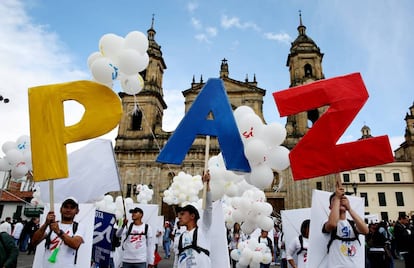Colombia’s new generation for peace
Young people are at the forefront of this historic moment in their country’s history

Colombians will go to the polls on Sunday to participate in a vote that has no candidates; a contest in which the contenders are not even political parties; yet it may be the most important decision they make as a country. The referendum that the government hopes will support the peace deal it has negotiated with the Revolutionary Armed Forces of Colombia (FARC) has become the hot topic of debate at universities. Young people stand at the forefront of this historic moment in their country. They are talking about peace and taking action to promote their views.
Ever since the government announced the signed peace accord, hundreds of university students have been gathering in downtown Bogota every Friday to discuss the peace process that took place in Havana. “It is a duty we have to assume. The challenge for young people is to transform this hateful country that we inherited into the country that we always dreamed of,” says Alejandro Franco, a 24-year-old political science student at Universidad de los Andes.
Our challenge is to transform this hateful country into one we always dreamed of
Alejandro Franco, political sciences student
Franco is a member of Jóvenes por el sí (or, Young People For Yes), a group that has drawn 1,500 people who, like him, feel certain that peace is the best opportunity for Colombia. They hold discussions via social media but they have also learned from the past: their messages cannot languish on Facebook profiles or Twitter. Instead, they have joined forces with other groups in order to make a bigger statement: the young people of Colombia care about the peace process. “The memory of the war that impacted me the most was when [FARC leader] Raúl Reyes died,” Franco says. I was surprised that there were people who were happy about it. I was sad to see that the enemy had stopped being a human being and that his death was cause for celebration.”
Groups like Franco’s have chosen to go beyond political discourse to engage others in discussions about the peace agreement. They organize concerts, hold marches, but, above all, they try to provide room for debate at the universities. The government’s chief negotiators during the talks with the FARC, Humberto de la Calle and Sergio Jaramillo, have talked and debated the process with students as equals. The best debates between those who advocate for a “yes” in the referendum and those who reject the peace deal have taken place on university campuses.
Alejandra Rojas, a 25-year-old student at Universidad Nacional, talks about the challenge posed by lack of financing for the campaign. She details how the group collected donations and crafted souvenirs to raise funds. Rojas says supporting the peace deal is not the same as a political alliance. “We cannot confuse support for peace with backing President Juan Manuel Santos. We simply have a longing for a country.”
The best debates between those who advocate for a “yes” and those who reject the deal have taken place on university campuses
Of the more than seven million people affected by the armed conflict, at least two million, 28% of the victims, are young people. “We can guarantee that this will not happen again,” Rojas says. With her vote, she will also celebrate the provisions for agricultural reform, the first element in the five-point peace accord. According to the Farming and Fish Census, 72.6% of people between ages 17 and 24 who live in rural areas do not have access to education and 11.5% of those aged 15 and above do not know how to read or write.
Students who reject the peace deal say they, too, are concerned with access to education in rural areas but they also demand more justice. Pablo Londoño, a 22-year-old political science major and member of Jóvenes decimos no (or, Young People Say No), says it has been more difficult for them to promote their side of the story. “Saying no is boring,” Londoño explains. “In this case, it’s synonymous with wanting war, but our invitation is not for a flat-out no but for renegotiation, especially on the issue of justice.” Pablo compares the level of student participation in the debate around the peace process to the efforts made by public and private university students to push Congress to rewrite its 105-year-old Constitution, which many Colombians considered obsolete. They managed to connect with the nation and thus served as catalysts for the 1991 Constitution. “Now we must contribute to a peaceful but also a just Colombia,” Londoño says.
Michelle Harb, a 24-year-old law student, says she is wearing a t-shirt to support the “yes” vote because she dreams of living “in a country where everyone fits, where there is no justification for picking up a weapon in order to say what you think.” “We want to be part of that change.” University students who have promoted voting in favor of the peace deal say it is their duty to make sure that the country does not live through the kind of violence it experienced for years. Their first goal is to encourage a massive turnout for Sunday’s referendum.
English version by Dyane Jean François.
Tu suscripción se está usando en otro dispositivo
¿Quieres añadir otro usuario a tu suscripción?
Si continúas leyendo en este dispositivo, no se podrá leer en el otro.
FlechaTu suscripción se está usando en otro dispositivo y solo puedes acceder a EL PAÍS desde un dispositivo a la vez.
Si quieres compartir tu cuenta, cambia tu suscripción a la modalidad Premium, así podrás añadir otro usuario. Cada uno accederá con su propia cuenta de email, lo que os permitirá personalizar vuestra experiencia en EL PAÍS.
¿Tienes una suscripción de empresa? Accede aquí para contratar más cuentas.
En el caso de no saber quién está usando tu cuenta, te recomendamos cambiar tu contraseña aquí.
Si decides continuar compartiendo tu cuenta, este mensaje se mostrará en tu dispositivo y en el de la otra persona que está usando tu cuenta de forma indefinida, afectando a tu experiencia de lectura. Puedes consultar aquí los términos y condiciones de la suscripción digital.









































